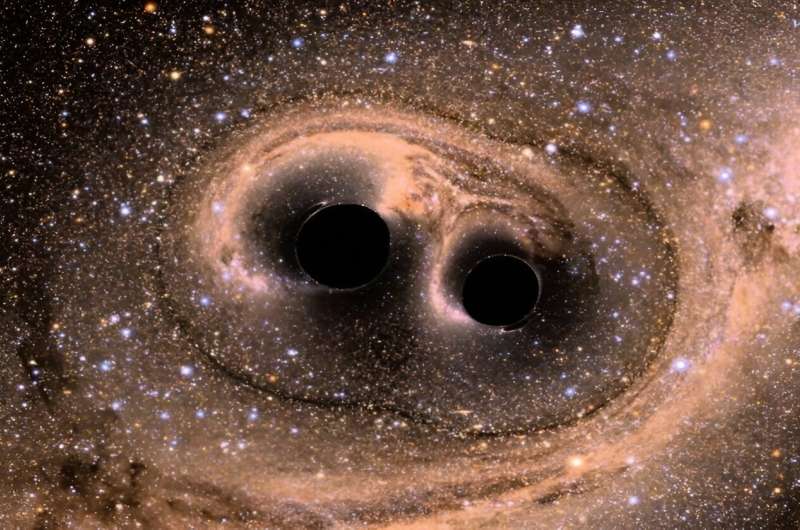
Two black holes are going to merge in this image of a simulation from the Simulating eXtreme Spacetimes collaboration. Credit: SXS Lensing/Simulating eXtreme Spacetimes Collaboration
This week, researchers proved empirically that life isn’t fair. Also, you’ll notice that, in a superhuman display of restraint, I managed to write a paragraph about the simulated universe hypothesis without once referencing “The Matrix.” (Except for this reference.)
Life unfair
Oh, so a European research team has proven that flipped coins aren’t actually fair? Buddy, life isn’t fair! Do you think the world owes you two equally probable outcomes as established by an axiomatic mathematical formalization? When I was a kid, we didn’t even have coins! We had to roll dice! It took 10 minutes to start a football game! Oh, so a coin is very slightly more likely to land on the same face as its initial position? Quit crying! It’s only a meaningful bias if you flip a coin multiple times!
Hail, traveler
Applying a recently discovered physical law, a physicist at the University of Portsmouth has contributed to the discussion about whether or not the universe is a simulation. The simulated universe hypothesis proposes that the universe is actually a simulation running on a vastly complex computing substrate and we’re therefore all just NPCs, walking through our animation loops and saying, “Hail, summoner! Conjure me up a warm bed!” and “Do you get to the Cloud District often?”
In his previous research, Dr. Melvin Vopson, an information theory expert, suggested that information itself has mass and that all elementary particles store information about themselves. In 2022, he discovered a new law of physics based on the second law of thermodynamics, which says that entropy increases over time. This new law, which he calls the second law of infodynamics, holds that entropy in information systems does not, in fact, increase over time; it remains constant or decreases. This could have a substantial impact on information-based fields like genetics research and evolutionary theory.
His new paper also proposes an explanation for the prevalence of symmetries in the universe; he suggests that high symmetry corresponds with the lowest information entropy state, and could account for the universe’s tendency to seek symmetry.
He says, “This approach, where excess information is removed, resembles the process of a computer deleting or compressing waste code to save storage space and optimize power consumption. And as a result, supports the idea that we’re living in a simulation.”
Spacetime wavy
Immense collisions in the universe cause gravitational waves so intense that they can be detected on earth, rippling at light speed through spacetime itself, which means that they’re tossing us on gravitational tempests like boats on a vasty, four-dimensional deep, right? Well, yes, very weakly per unit volume of space. It shouldn’t interfere with your yard work or whatever.
The physics of black hole collisions are complicated, and a multi-institutional team of physicists are leveraging supercomputers to model the entire process from the initial gravitational spiral to the merger and its aftermath. Among their findings is a notable confirmation that separate gravitational waves influence each other; previous models suggested that gravitational waves do not interfere with each other, but the new, more detailed analysis showed that they do interact, creating new, more chaotic types of waves. One benefit of new modeling will be the ability to better interpret LIGO data as it records new collisions.
Wife disappointed
Time travel isn’t a possibility at a practical level, but researchers at the University of Cambridge are simulating the transmission of information backward in time by exploiting entanglement. However, instead of considering the most practical application—gambling—they propose a scenario that can be best described as “the quantum physics of shopping.”
Imagine you’re a terrible husband and you don’t know what gift your wife wants for your anniversary in three days. You need to order a gift today, but she doesn’t send you her wish list until day two. Thus, it’s impossible for you to know what she wants in advance because—as previously established—you are a terrible husband who doesn’t pay attention to your spouse’s wants and needs.
The researchers constructed a simulation in which you could retroactively change your previous actions to ensure the right gift arrives. In their proposal, an experimentalist entangles two particles. The first particle is sent to be used in an experiment. Upon receiving the experimental results, the experimentalist manipulates the second particle to alter the first particle’s past state, thus changing the outcome of the experiment.
OK, but here’s the interesting part: According to the researchers, the effect works, but only 1 out of 4 times. In the online shopping scenario, you could send four gifts to your spouse, but three of them would be wrong. Lead author David Arvidsson-Shukur says, “We are not proposing a time travel machine, but rather a deep dive into the fundamentals of quantum mechanics. These simulations do not allow you to go back and alter your past, but they do allow you to create a better tomorrow by fixing yesterday’s problems today.”
© 2023 Science X Network
Citation:
Saturday Citations: Gravitational waves, time travel and the simulated universe hypothesis (2023, October 14)
retrieved 14 October 2023
from https://phys.org/news/2023-10-saturday-citations-gravitational-simulated-universe.html
This document is subject to copyright. Apart from any fair dealing for the purpose of private study or research, no
part may be reproduced without the written permission. The content is provided for information purposes only.
>>> Read full article>>>
Copyright for syndicated content belongs to the linked Source : Phys.org – https://phys.org/news/2023-10-saturday-citations-gravitational-simulated-universe.html
